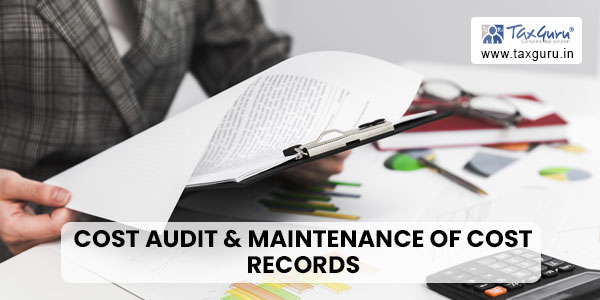“Understand the applicability of Cost Audit and Maintenance of Cost Records in the Construction Industry. Learn about rules, coverage, turnover criteria, and the duties of companies for appointment of cost auditors. Explore different Construction Project Models like PPP, Real Estate Development, and EPC Contracting. Consequences of non-compliance and steps required for maintaining cost records. Expert insights shared by Guruprakash N. Bhambore, Secretary-The Bombay Commodity Association Ltd.”
Construction Industry – Applicability of Cost Audit & Maintenance of Cost Records
First of all anyone has to check whether the Cost Audit or maintenance of cost records are /were applicable on the industry or not. So to check we have to go through these condition which are given below:-
The Central Government issued Amended Companies (Cost Records & Audit) Rules, on 31st December 2014. So Companies (Cost Records & Audit) Rules, 2014 must be read with amended rules 2014 and these rules are now applicable to Construction companies, Roads & Infrastructure Companies.
How to check the applicability of rules
Step – 1: – If company is/has undertaken these types of projects/activities, then please move to Step-2
|
Rules of Coverage for “Roads & Infrastructure projects” |
Rules of Coverage for “Construction Industry” |
| It has been defined to the corresponding Para 1(a) as specified in schedule VI of the Companies Act 2013. According to this sub clause, “Road & Infrastructure Projects Cover”:-
1. Roads 2. National Highways 3. State Highways 4. Major District Roads 5. Other District Roads 6. Toll Roads 7. Bridges 8. Highways 9. Road Transport Providers & 10. Other road related services Hence, every activity including construction & maintenance of the above projects are covered under the rules. |
Construction Industry has been defined to the corresponding Para (5)(a) as specified in schedule VI of the Companies Act 2013. According to this Para (5) pertains to:-
1. Industrial 2. Commercial 3. Social Development & Maintenance And covers “Real Estate Development” including an “Industrial Park” or “Special Economic Zone” Hence, every construction activity in relation to the above are covered under the rules |
Step -2:- Check out the Turnover* of Company in Immediate preceding Financial Year
|
Applicability for Maintenance of Cost Records |
Applicability for Cost Audit |
| If the turnover of company which engaged in above mentioned activities, having a turnover Rupees 35 Crore or more in Immediate preceding financial year, has to comply with maintenance of Cost Records (as per CRA-1) | If the turnover of company which engaged in above mentioned activities, having a turnover Rupees 100 Crore or more in Immediate preceding financial year, then Cost Audit is applicable on it. |
- For this purpose Turnover means Gross turnover from the sale or supply of all products or services during the financial year. It includes the turnover from Job Work or Loan License operation & Export benefit received but excludes duties & taxes.
Duties of Companies for Appointment of Cost Auditor
In relation to the provision of section 148 of the Companies Act, 2013 and the rules framed there under:-
What to do by Company?
|
Step – 1 |
Appoint a Cost Auditor within 180 days of the commencement of every financial year |
| Step – 2 | Inform the Cost Auditor concerned of his or its appointment |
| Step – 3 | File a notice of such appointment with Central Government within 30 days of the Board Meeting in which such appointment is made or within a period of 180 days of the commencement of the financial year, whichever is earlier, through electronic mode, in e-form CRA-2 (For appointment of Cost Auditor), along with fees as specified in Companies (Registration Offices & Fees) Rules, 2014 |
| Step – 4 | Within a period of 30 days from the date of receipt of a copy of the full cost audit report, furnish to Central Government with such report along with full information and explanation on every reservation or qualification contained therein, in Form CRA-4 (Filing of Cost Audit Report) along with a fees as specified in Companies (Registration Offices & Fees) Rules, 2014 |
“Cost records” means books of account relating to utilization of materials, labour and other items of cost as applicable to the production of goods or provision of services as provided in section 148 of the Act and these rules; There cannot be any exhaustive list of cost accounting records. Any transaction – statistical, quantitative or other details – that has a bearing on the cost of the product/activity is important and form part of the cost accounting records. Cost records are to be kept on regular basis to make it possible to “calculate per unit cost of production/operations, cost of sales and margin for each of its products for every financial year on monthly/quarterly/half-yearly/annual basis“.
There are different types of Construction Project Models, which is discussed below in short Public Private Partnership (PPP) Model
Project under PPP arrangement, i.e. development, financing, constructing, maintenance and operation, are implemented for the Project Term by a Private / Public Sector Company to be selected by the Government or a statutory entity.
The PPP Projects are usually in the following sectors:
1. Roads and bridges, railways, seaports, airports, inland waterways, hotels;
2. Power generation, transmission, distribution
3. Urban transport, water supply, sewerage, solid waste management
4. Physical infrastructure in urban areas
5. Infrastructure projects in Special Economic Zones
Few abbreviations frequently used in PPP model
BOO – Build Own Operate
BOLT – Build Own Lease Transfer
BOOST – Build Own Operate Share Transfer
BOT- Build, Operate and Transfer
BOOT- Build, Own, Operate and Transfer
BOLT ‐ Build Own Lease Transfer and many more

Real Estate Development Model
This model is generally and essentially used in h development of land and construction/development of anything which permanently attached with the earth. Real estate development includes purchasing land, real estate, making changes to the land or existing one.
There are few examples of Real estate development projects such as
1. Housing, Land and Township Infrastructure Development
2. Development of commercial real estate
3. Development of Corporate IT parks
EPC Contracting Model
Engineering, procurement, and construction (EPC) contracts (a type of turnkey contract) are a form of contract used to undertake construction works by the private sector on large-scale and complex infrastructure projects. The business model is primarily Engineering, Procurement and Construction. CARR will be applicable from the initial stage of Engineering or Procurement or construction activity.
Consequence of Non Compliance of Section 148 of the Companies Act, 2013
(a) The company and every officer of the company who is in default shall be punishable in the manner as provided in sub-section (1) of section 147;
Punishment for contravention of section 147(1), If any of the provisions of sections 139 to 146 (both inclusive) is contravened, the company shall be punishable with fine which shall not be less than Rs.25000 rupees but which may extend to Rs. 500000 and every officer of the company who is in default shall be punishable with imprisonment for a term which may extend to one year or with fine which shall not be less than Rs. 10000 but which may extend to Rs. 100000 or both.
Nature of Defaults under section 148 of the Companies Act, 2013
1. Non maintenance of Cost Records
2. Cost Auditor has not been appointed by the Company
3. Late appointment of Cost Auditor
4. Cost Auditor appointed but CRA-2 form has not been filed with MCA
5. Cost Auditor appointed but Cost Records were not submitted to Cost Auditor for Cost Audit
6. Non cooperation regarding the timely completion of Cost Audit
7. Annexure to Cost Audit not approved within the specified time limit
8. Cost Audit report approved but not submitted to Central Government by the Company
Steps required for maintenance of Cost Records:
1. Prepare check list for compliance with the provisions of CAS and GACAP in regard
2. Prepare and collect element wise cost such as material, labour tc and also collect in detail the quantitative details
3. Project wise details to be collected and cost statements are to be prepared
4. Closely monitor the inter unit transfer, whether they are at cost or not in cost records






is cost audit applicable to pvt ltd company doing road construction , pwd work and railways project having a turnover more then 300 cr
Request to update cost records frequired to maintain by co